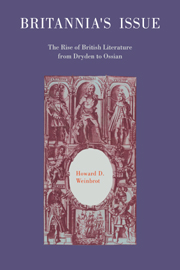Book contents
- Frontmatter
- Contents
- Acknowledgments and editorial notes
- INTRODUCTION: An overview of scope and method
- PART I CONTEXTS: INTELLECTUAL, PSYCHOLOGICAL, AND NATIONAL
- PART II TEXTS WITHIN CONTEXTS. ESSAYING ENGLAND: OUR GENIUS, OUR CLIME
- Prologue to Part II
- 5 DRYDEN'S “ESSAY OF DRAMATICK POESIE:” THE POETICS OF NATIONALISM
- 6 HOMERIC WARS
- 7 THE “PAX ROMANA” AND THE “PAX BRITANNICA”: THE ETHICS OF WAR AND THE ETHICS OF TRADE
- 8 “WINDSOR FOREST” AND “THE RAPE OF THE LOCK”
- PART III GROWING ONE'S OWN. THE BRITISH ODE FROM COWLEY TO GRAY
- PART IV EXPANDING THE BORDERS. JEWS AND JESUS: THIS ISRAEL, THIS ENGLAND
- PART V CELTS, GERMANS, AND SCOTS: TOWARDS A UNITED KINGDOM
- APPENDIX: The text of Handel's “Israel in Egypt”
- Index
7 - THE “PAX ROMANA” AND THE “PAX BRITANNICA”: THE ETHICS OF WAR AND THE ETHICS OF TRADE
Published online by Cambridge University Press: 15 December 2009
- Frontmatter
- Contents
- Acknowledgments and editorial notes
- INTRODUCTION: An overview of scope and method
- PART I CONTEXTS: INTELLECTUAL, PSYCHOLOGICAL, AND NATIONAL
- PART II TEXTS WITHIN CONTEXTS. ESSAYING ENGLAND: OUR GENIUS, OUR CLIME
- Prologue to Part II
- 5 DRYDEN'S “ESSAY OF DRAMATICK POESIE:” THE POETICS OF NATIONALISM
- 6 HOMERIC WARS
- 7 THE “PAX ROMANA” AND THE “PAX BRITANNICA”: THE ETHICS OF WAR AND THE ETHICS OF TRADE
- 8 “WINDSOR FOREST” AND “THE RAPE OF THE LOCK”
- PART III GROWING ONE'S OWN. THE BRITISH ODE FROM COWLEY TO GRAY
- PART IV EXPANDING THE BORDERS. JEWS AND JESUS: THIS ISRAEL, THIS ENGLAND
- PART V CELTS, GERMANS, AND SCOTS: TOWARDS A UNITED KINGDOM
- APPENDIX: The text of Handel's “Israel in Egypt”
- Index
Summary
The staggering achievements of the Roman empire were evident through much of Europe and its literature. Book 6. 851–53, of Virgil's Aeneid offers a paradigm of the imperial mission that Dryden's polite version enhances with a typically English flourish alien to the original – freeing slaves. Anchises in the underworld tells Aeneas of Rome's great Augustan future:
Rome, ‘tis thine alone, with awful sway,
To rule Mankind; and make the World obey;
Disposing Peace, and War thy own Majestick Way.
To tame the Proud, the fetter'd Slave to free;
These are Imperial Arts, and worthy thee.’
The primacy of Roman governance was thus communicated to school-boys, some of whom as literate adults would adapt it for their own purposes. Indeed, numerous Romanized speechifiers inflicted such high virtue upon Restoration and eighteenth-century auditors and readers. Nathaniel Lee's Lucius Junius Brutus (1681) sees the future, when the city is purged of its grosser elements, and can fulfill the Virgilian imperative.
Rome shall build her Empire to the Stars,
Send her Commanders with her Armies forth,
To Tame the World, and give the Nations Law,
Consuls, Proconsuls, who to the Capitol
Shall ride upon the Necks of Conquer'd Kings;
And when they dye, mount from the gorgeous Pile
In Flames of Spice, and mingle with the Gods.
We recall that Juba, the civilized Numidian prince in Addison's Cato (1713), speaks comparable words, and praises Roman “Wisdom, Discipline, and lib'ral Arts” which embellish, reform and “break our fierce Barbarians into Men.”
- Type
- Chapter
- Information
- Britannia's IssueThe Rise of British Literature from Dryden to Ossian, pp. 237 - 275Publisher: Cambridge University PressPrint publication year: 1993



